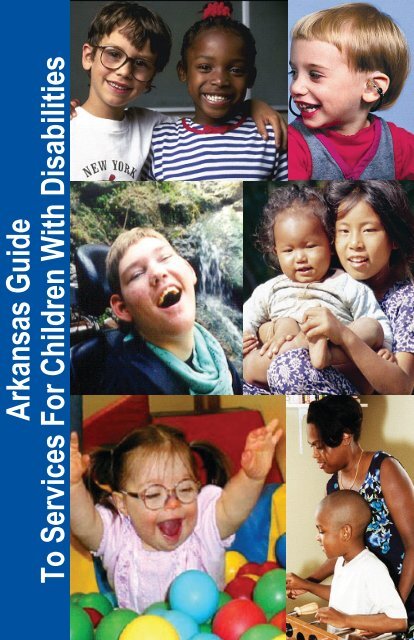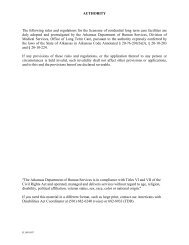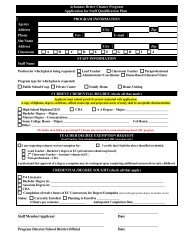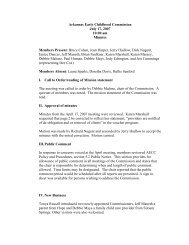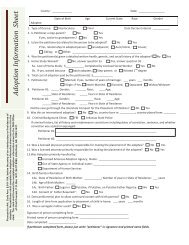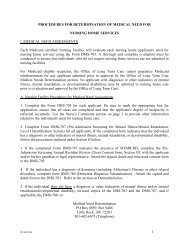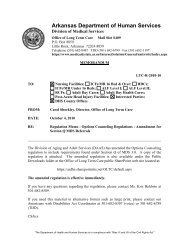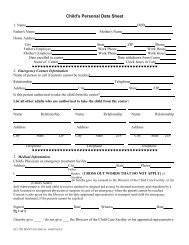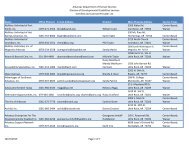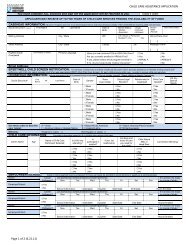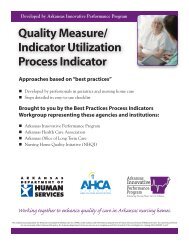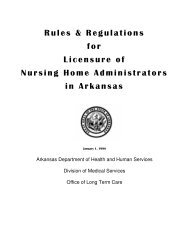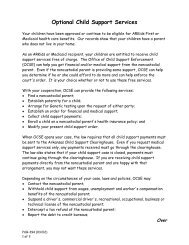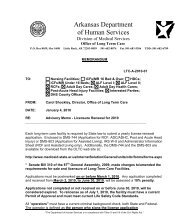Arkansas Guide to Services for Children with Disabilities
Arkansas Guide to Services for Children with Disabilities
Arkansas Guide to Services for Children with Disabilities
Create successful ePaper yourself
Turn your PDF publications into a flip-book with our unique Google optimized e-Paper software.
<strong>Arkansas</strong> <strong>Guide</strong><br />
To <strong>Services</strong> For <strong>Children</strong> With <strong>Disabilities</strong>
We would like <strong>to</strong> thank ASMP volunteer Gloria<br />
Gordon, who wrote this guide and the DDS Grants<br />
Advisory Council, who reviewed <strong>to</strong> the guide.<br />
First Printing September 2005<br />
One of the goals of the C-Pass Grant is <strong>to</strong> promote<br />
self-determination <strong>for</strong> adults <strong>with</strong> disabilities. The<br />
in<strong>for</strong>mation included in this booklet is a starting point<br />
in educating and in<strong>for</strong>ming caregivers of children<br />
about their rights and in creating early expectations<br />
and models <strong>for</strong> self-determination.<br />
One of the primary goals of the Senior<br />
Medicare/Medicaid Patrol project is <strong>to</strong> provide<br />
education and in<strong>for</strong>mation <strong>to</strong> seniors and people<br />
<strong>with</strong> disabilities <strong>to</strong> empower them <strong>to</strong> be active and<br />
in<strong>for</strong>med consumers of health care.<br />
This booklet is the result of a collaborative ef<strong>for</strong>t<br />
between these two state programs that share<br />
common goals in serving the citizens of <strong>Arkansas</strong>.
ARKANSAS GUIDE TO SERVICES FOR<br />
CHILDREN WITH DISABILITIES<br />
By Gloria Gordon, MS<br />
TABLE OF CONTENTS<br />
Where <strong>to</strong> Begin? .......................................... 1<br />
What Are the Rights of a Person With<br />
<strong>Disabilities</strong>?.................................................. 5<br />
Learn the Language................................... 10<br />
Language You Should Use ....................... 15<br />
<strong>Services</strong> For <strong>Children</strong> With <strong>Disabilities</strong> ... 16<br />
Who Will Pay For Your Child’s <strong>Services</strong>? 43<br />
Where Will Your Child Live? ..................... 49<br />
What Is Healthcare Fraud and Why You<br />
Should Care About It? ............................... 54<br />
Dictionary of More Words You May Need<br />
To Know ..................................................... 59<br />
Alphabet Soup ........................................... 62
WHERE TO BEGIN?<br />
Adjust Your Attitude:<br />
Jim Eakin, a wise and well-loved<br />
<strong>Arkansas</strong> self-advocate, contrasted the<br />
birth of a “normal” child – an event<br />
greeted <strong>with</strong> joy and celebration – <strong>with</strong><br />
that of a child <strong>with</strong> disabilities.<br />
New parents of children <strong>with</strong> disabilities<br />
often react <strong>with</strong> denial, anger, grief, and<br />
a feeling of loss <strong>for</strong> what might have<br />
been. They may feel afraid, confused<br />
and powerless. Disappointment that a child is not “perfect”<br />
can create reluctance [unwillingness] <strong>to</strong> accept one’s child as<br />
a valuable, developing person.*<br />
If your child sees nothing but sadness and<br />
resignation in your eyes, it will be an additional<br />
challenge <strong>for</strong> him <strong>to</strong> reach his full potential.<br />
As you raise your child <strong>with</strong> a disability, “remember that most<br />
of the regular child-raising issues will apply — children <strong>with</strong><br />
disabilities will go through the usual childhood stages. They<br />
may not go through stages at the same age, at the same rate,<br />
or use the same words as children <strong>with</strong>out disabilities,<br />
“but they are children and kids are kids…they<br />
should have the same opportunities.” **<br />
* Smith, PM (2003). You Are Not Alone: For Parents When They<br />
Learn That Their Child Has a Disability. NICHCY News Digest ND 20,<br />
3rd Ed.<br />
** Brown, Goodman, and Küpper (2003). The Unplanned Journey:<br />
When You Learn That Your Child Has a Disability. NICHCY News<br />
Digest.<br />
1
“Your child’s development may be different from that of other<br />
children, but this does not make your child less valuable, less<br />
human, less important, or in less need of your love and<br />
parenting. Love and enjoy your child.”<br />
You are Not Alone.<br />
“The child comes first;<br />
the disability comes second.”*<br />
Although you may feel isolated and overwhelmed by the<br />
challenges associated <strong>with</strong> your child’s disability, many services<br />
and supports are available <strong>to</strong> assist your entire family. Much<br />
of the in<strong>for</strong>mation that you need is “in the hands, heads, and<br />
hearts of other parents like yourself.”**<br />
Seek out other parents who have<br />
“been there” and “done that.”<br />
2
<strong>Arkansas</strong> has a number of non-profit cross-disability<br />
organizations whose members are adults <strong>with</strong> disabilities and<br />
parents of children <strong>with</strong> disabilities. Two of these are Advocates<br />
Needed Today, Inc. and <strong>Arkansas</strong> People First. They can<br />
provide emotional support and a wealth of in<strong>for</strong>mation on how<br />
<strong>to</strong> get the services you need <strong>for</strong> your child. They conduct<br />
training sessions <strong>for</strong> parents across the State and provide one<br />
on one personal assistance.<br />
Advocates Needed Today, Inc.<br />
(ANTs)<br />
1809 Martha Drive<br />
Little Rock, AR 72212<br />
(501) 227-4278<br />
“We remind ourselves of the power<br />
of love, of compassion, and of the<br />
spirit as we do this work.”<br />
AND<br />
2592 North Gregg Avenue Suite 1<br />
Fayetteville, AR 72703<br />
Toll free: 1-888-488-6040<br />
3<br />
“Working <strong>to</strong>gether <strong>for</strong> our rights as PEOPLE FIRST,<br />
speaking <strong>for</strong> ourselves as members of the<br />
community.”
Other organizations provide support and in<strong>for</strong>mation about<br />
specific conditions – like cerebral palsy, autism, or spinal cord<br />
injury.<br />
For a complete list of organizations and access <strong>to</strong> a library of<br />
educational materials on disabilities and disability services,<br />
contact:<br />
The <strong>Arkansas</strong> Independent Living Council (AILC)<br />
8500 West Markham, Ste 215<br />
Little Rock, AR 72205<br />
(501) 372-0607<br />
Toll free: 1-800-772-0607<br />
OR<br />
The Governor’s Developmental <strong>Disabilities</strong> Council<br />
Freeway Medical Tower, 5800 West 10 th Street<br />
Little Rock, AR 72204<br />
(501) 661-2589<br />
Toll-free: 1-800-482-5400, Extension 2589<br />
Be sure <strong>to</strong> request a “Vital Records <strong>Guide</strong>” from the DD Council<br />
<strong>to</strong> keep track of important medical and personal care<br />
in<strong>for</strong>mation.<br />
4
WHAT ARE THE RIGHTS OF A PERSON WITH<br />
DISABILITIES?<br />
First and <strong>for</strong>emost, your child has<br />
the same constitutional and legal<br />
rights as every other citizen, plus<br />
additional rights that have <strong>to</strong> do <strong>with</strong><br />
having a disability.<br />
Right <strong>to</strong> be free from discrimination because you<br />
have a disability:*<br />
●<br />
●<br />
●<br />
●<br />
●<br />
To have equal employment opportunities.<br />
To benefit from public programs such as education,<br />
employment, transportation, recreation, health care,<br />
social services, courts, voting, and <strong>to</strong>wn meetings, etc.<br />
To have equal access <strong>to</strong> public transportation (city<br />
buses, subways, commuter rails, etc.) that is accessible<br />
(<strong>with</strong>in reach, especially <strong>for</strong> persons in wheelchairs).<br />
To have access <strong>to</strong> public buildings and public<br />
accommodations such as restaurants, hotels, movie<br />
theaters, recreational facilities, etc.<br />
To have the use of special telephone services** and<br />
closed captioning of TV public service announcements<br />
<strong>for</strong> people <strong>with</strong> hearing and speech disabilities.<br />
* The Americans <strong>with</strong> <strong>Disabilities</strong> Act (ADA)<br />
** Telecommunications relay services (TRS)<br />
5
Right <strong>to</strong> equal housing opportunities:*<br />
●<br />
●<br />
Landlords must make exceptions <strong>to</strong><br />
a “no pets” rule <strong>for</strong> service animals<br />
(like guide dogs or hearing dogs, <strong>for</strong><br />
example).<br />
Landlords must allow tenants <strong>to</strong> make<br />
changes <strong>to</strong> their private living area and<br />
common use spaces <strong>to</strong> make them<br />
handicap accessible.<br />
Right <strong>to</strong> vote:**<br />
●<br />
●<br />
Polling places must be physically accessible <strong>to</strong> people <strong>with</strong><br />
disabilities or provide alternate means <strong>to</strong> cast ballots.<br />
Voting aids must be provided <strong>for</strong> elderly<br />
and disabled voters, including<br />
telecommunications devices <strong>for</strong> the deaf.<br />
* Fair Housing Act<br />
** Voting Accessibility <strong>for</strong> the Elderly and Handicapped Act<br />
6
Right <strong>to</strong> fly:*<br />
●<br />
●<br />
People <strong>with</strong> disabilities must be assisted <strong>with</strong> boarding.<br />
Airplanes must have accessible features.<br />
Right <strong>to</strong> free appropriate public education<br />
(FAPE):**<br />
● Public schools must develop an appropriate (suitable)<br />
Individualized Education Plan (IEP) <strong>for</strong> your child that<br />
reflects his or her individual needs,including<br />
special education and related services, if<br />
necessary.<br />
●<br />
●<br />
●<br />
The IEP must be developed by a team<br />
that includes, among others, your child’s<br />
teacher and YOU.<br />
If you are not satisfied <strong>with</strong> your child’s<br />
IEP, you have the right <strong>to</strong> an appeal.<br />
Transition services must be provided <strong>to</strong> prepare your child<br />
<strong>for</strong> further education, employment and independent living,<br />
and must begin no later than age 16. (A transition is a<br />
change from one environment or service delivery model<br />
<strong>to</strong> another – <strong>for</strong> example, leaving early intervention services<br />
and entering preschool).<br />
* Air Carrier Access Act<br />
** The Individuals <strong>with</strong> <strong>Disabilities</strong> Education Act (IDEA)<br />
7
●<br />
Schools must outline clear and specific transition goals in<br />
the IEP based on “age appropriate transition assessments.”<br />
Right <strong>to</strong> be educated in the “least restrictive<br />
environment appropriate <strong>to</strong> the child’s individual<br />
needs:”*<br />
● <strong>Children</strong> <strong>with</strong> disabilities have the right <strong>to</strong> associate <strong>with</strong><br />
non-disabled children in “mainstreamed” classrooms and <strong>to</strong><br />
take part in the general education course work whenever<br />
possible, using supplementary (extra) aides and services, if<br />
necessary.<br />
* The Individuals <strong>with</strong> <strong>Disabilities</strong> Education Act (IDEA)<br />
8
●<br />
●<br />
●<br />
If special education services can be provided in a<br />
“non segregated” classroom (<strong>with</strong> non-disabled students)<br />
and the child’s schoolwork benefits, then a segregated<br />
(separate) special education placement would be<br />
considered “<strong>to</strong>o restrictive.”<br />
An exception allows separate classrooms<br />
<strong>for</strong> students whose behavior disturbs the<br />
education of other students.<br />
Separate classrooms are also<br />
allowed if a child’s disability is so<br />
severe that the use of supplementary<br />
aides and services in the general<br />
classroom cannot meet the child’s<br />
educational needs.*<br />
If you feel that your child’s rights are not being<br />
honored, contact:<br />
The Disability Rights Center (DRC)<br />
1100 North University Avenue, Suite 201<br />
Little Rock, AR 72207<br />
(501) 296-1775 v/tty<br />
Toll free: 1-800-482-1174 v/tty<br />
www/arkdisabilityrights.org<br />
DRC is the Protection and Advocacy System and<br />
Client Assistance Program <strong>for</strong> people <strong>with</strong><br />
disabilities in <strong>Arkansas</strong>.<br />
* 20 U.S.C. 1412 (a)(5)<br />
9
What is a disability?<br />
LEARN THE LANGUAGE.<br />
A disability is “a physical or mental impairment [injury] that<br />
substantially limits a major life function.” *<br />
For purposes of education, a “child <strong>with</strong> a disability” is one<br />
who has one or more of the following disabilities: “mental<br />
retardation, a hearing impairment including deafness, a speech<br />
or language impairment, a visual impairment including<br />
blindness, serious emotional disturbance, an orthopedic<br />
impairment, autism, traumatic brain injury, another health<br />
impairment, a specific learning disability, deaf-blindness, or<br />
multiple disabilities, and who, by reason thereof, needs special<br />
education and related services.” **<br />
Once it is determined that a child needs special education and/<br />
or related services , the meaning of “child <strong>with</strong> a disability” will<br />
vary somewhat depending on the child’s age and type(s) of<br />
“developmental delays” – interruptions in physical growth and<br />
the development of intelligence and ability <strong>to</strong> solve problems.<br />
What is a developmental disability?<br />
A developmental disability is a substantial, long-term disability<br />
that begins any time from birth through age 21 and is expected<br />
<strong>to</strong> last <strong>for</strong> a lifetime. Although you may not always be able <strong>to</strong><br />
see these disabilities, they can seriously limit your child’s daily<br />
activities of life, including self-care, communication, learning,<br />
mobility (the ability <strong>to</strong> move), or being able <strong>to</strong> work or live<br />
independently.<br />
<strong>Arkansas</strong> law says that a developmental disability is “an<br />
impairment of general intellectual functioning or adaptive<br />
behavior” that is a “substantial handicap <strong>to</strong> the person’s ability<br />
* <strong>Arkansas</strong> Code 16-123-102(3)<br />
** The Individuals <strong>with</strong> <strong>Disabilities</strong> Education Act (IDEA)<br />
10
<strong>to</strong> function <strong>with</strong>out appropriate support services, including, but<br />
not limited <strong>to</strong>, planned recreational activities, medical services<br />
such as physical therapy and speech therapy, and possibilities<br />
<strong>for</strong> sheltered employment or job training.” It is caused by mental<br />
retardation or a closely related condition; cerebral palsy;<br />
epilepsy; autism; or dyslexia (difficulty learning <strong>to</strong> read and<br />
spell) resulting from cerebral palsy, epilepsy, or autism.*<br />
What is mental retardation?<br />
A person is considered <strong>to</strong> be mentally retarded if: he or she<br />
has “a mental deficit requiring him or her <strong>to</strong> have special<br />
evaluation, treatment, care, education, training, supervision,<br />
or control in his or her home or community, or in a state<br />
institution <strong>for</strong> the mentally retarded.” **<br />
The definition also includes “a functionally retarded person who<br />
may not exhibit an intellectual deficit on standard psychological<br />
tests, but who, because of other handicaps, functions as a<br />
retarded person.” **<br />
Other developmental disabilities:<br />
Autism is a complicated developmental disability that has a<br />
negative effect on verbal and nonverbal communication, social<br />
interaction, and a child’s schoolwork. Autistic children per<strong>for</strong>m<br />
repetitive activities and movements, repeat words or phrases<br />
just spoken by others, and resist change in their surroundings<br />
or in daily routines. Autism usually appears during the first<br />
3 years of life and affects each child differently, which makes<br />
early diagnosis and treatment very important.<br />
* <strong>Arkansas</strong> Code. 20-48-101 and Act 729 of 1993<br />
** <strong>Arkansas</strong> Code 20-48-202(6)<br />
11
Cerebral palsy is a group of long-term conditions affecting<br />
body movements and muscle control and coordination. It is<br />
caused by damage <strong>to</strong> the brain during fetal development or<br />
shortly following birth. <strong>Children</strong> <strong>with</strong> cerebral palsy may not be<br />
able <strong>to</strong> walk, talk, eat or play in the same ways as most other<br />
children. They may have involuntary movements, problems<br />
<strong>with</strong> sight, hearing or speech, and/or seizures.<br />
Deaf-blindness means having both hearing and vision<br />
impairments that are <strong>to</strong>o severe <strong>for</strong> a child <strong>to</strong> attend special<br />
education programs.<br />
Epilepsy is a brain disorder or ailment that causes seizures<br />
where the child may or may not lose consciousness and/or<br />
move or behave in an unusual way. It may be hereditary<br />
(passed down in families) or related <strong>to</strong> a brain injury, but most<br />
of the time the cause is unknown.<br />
Orthopedic impairments are injuries <strong>to</strong> bones and muscles<br />
and include birth defects (<strong>for</strong> example, clubfoot, absence of a<br />
limb, etc.), impairments caused by disease (<strong>for</strong> example, polio,<br />
bone tuberculosis, etc.), and impairments from other causes<br />
(such as cerebral palsy, amputations, and fractures or burns).<br />
Seizures are not a disease. They are a symp<strong>to</strong>m or warning<br />
sign of many different disorders that can affect the brain. Some<br />
seizures cause loss of consciousness, <strong>with</strong> twitching or shaking<br />
of the body. However, others consist of staring spells that can<br />
easily go unnoticed.<br />
Other health impairments include having limited strength,<br />
vitality (energy), or alertness that affects the ability <strong>to</strong> learn.<br />
These may result from short- or long-term health problems such<br />
as asthma, attention deficit disorder (ADD) or attention deficit<br />
hyperactivity disorder (ADHD), diabetes, epilepsy, a heart<br />
condition, sickle cell anemia, etc.<br />
12
What is a learning disability?<br />
Simply stated, a learning disability is a problem <strong>with</strong> listening,<br />
speaking, reading, writing, spelling, reasoning and/or doing<br />
mathematics that is not caused by a visual or hearing problem,<br />
mental retardation, or cultural or economic disadvantage.<br />
Federal law defines it as “a disorder in one or more of the<br />
basic psychological [mental] processes involved in<br />
understanding or in using language, spoken or<br />
written…including conditions such as perceptual disabilities<br />
[related <strong>to</strong> awareness and understanding], brain injury, minimal<br />
brain dysfunction [impairment], dyslexia [difficulty learning <strong>to</strong><br />
read and spell], and developmental aphasia” (See Dictionary<br />
of More Words You May Need <strong>to</strong> Know) that is not related <strong>to</strong><br />
environmental, cultural, or economic disadvantage.*<br />
Emotional disturbances:<br />
A child <strong>with</strong> an emotional disturbance is an individual under<br />
the age of 18 (or under the age of 21 if he or she started<br />
receiving services be<strong>for</strong>e age 18) who has “inappropriate<br />
[unsuitable] emotional, interpersonal, or behavioral problems<br />
<strong>with</strong>in the home, preschool program, school, or community<br />
given his or her age, intellectual level, and cultural background.”<br />
These behavioral problems are disruptive and often disabling,<br />
and continue despite the ef<strong>for</strong>ts of family and friends.**<br />
Emotional disturbances have a harmful effect on a child’s<br />
per<strong>for</strong>mance at school when they continue over a long period<br />
of time and have one or more of the following characteristics:<br />
●<br />
An inability <strong>to</strong> learn that cannot readily be explained;<br />
* IDEA<br />
** <strong>Arkansas</strong> Code 20-47-502<br />
13
●<br />
An inability <strong>to</strong> build or maintain satisfac<strong>to</strong>ry relationships<br />
<strong>with</strong> other children and teachers;<br />
●<br />
Inappropriate (out of place) types of behavior or feelings<br />
under normal circumstances;<br />
●<br />
A general pervasive (over all) mood of unhappiness or<br />
depression; and/or<br />
●<br />
A tendency <strong>to</strong> develop physical symp<strong>to</strong>ms or fears related<br />
<strong>to</strong> personal or school problems.<br />
What is a developmental delay?<br />
Developmental delay is a term used <strong>to</strong> describe an interruption<br />
in physical growth, the development of intelligence, or the ability<br />
<strong>to</strong> solve problems in an infant or child who is developing slower<br />
than normal in one or more of these areas:<br />
● Physical development;<br />
●<br />
●<br />
●<br />
●<br />
Cognitive development (relating <strong>to</strong> awareness and<br />
judgment);<br />
Communication development;<br />
Social or emotional development; or<br />
Adaptive development (the ability <strong>to</strong> adjust <strong>to</strong> change).<br />
<strong>Children</strong> <strong>with</strong> developmental delays need special education<br />
and related services.* A child may be described as “at risk” if<br />
his development may be delayed unless he receives early<br />
intervention services (See <strong>Services</strong> For <strong>Children</strong> With<br />
<strong>Disabilities</strong>).<br />
* IDEA<br />
14
LANGUAGE YOU SHOULD USE:<br />
In recent years, people <strong>with</strong> disabilities have acquired a will<br />
and a voice of their own. More and more, self-advocates and<br />
their families are shaping public policy regarding the rights of<br />
people <strong>with</strong> disabilities and their wishes <strong>with</strong> regard <strong>to</strong> selfdetermination,<br />
equal opportunities, and self-respect.<br />
They have made it clear that they want <strong>to</strong> be viewed as people,<br />
rather than problems or conditions. To this end, they prefer<br />
the positive perception created by “people first” language<br />
that puts the person be<strong>for</strong>e the disability – “people <strong>with</strong><br />
disabilities,” not “disabled people.”<br />
Although federal and state law and regulations use the terms<br />
“mental retardation” and “mentally retarded,” you should not.<br />
People <strong>with</strong> mental retardation are considered <strong>to</strong> be<br />
“developmentally disabled.” <strong>Arkansas</strong> law says that<br />
developmental disabilities include conditions other than mental<br />
retardation (See Learn the Language). However, it is preferable<br />
<strong>to</strong> always say, “a person has a developmental disability,” rather<br />
than “he is mentally retarded.”<br />
Mental illness is another term that creates a negative<br />
perception. Instead of saying “mentally ill child,” say “a child<br />
<strong>with</strong> an emotional disturbance” or “behavioral problem.”<br />
Organizations that have been around <strong>for</strong> a long time – like the<br />
ARC (previously the Association of Retarded Citizens) or VOR<br />
(previously the Voice of the Retarded) no longer spell out their<br />
names. Neither does NAMI (previously the National Alliance<br />
<strong>for</strong> the Mentally Ill). This is similar <strong>to</strong> the situation <strong>with</strong> AARP.<br />
It is no longer the American Association <strong>for</strong> Retired Persons<br />
because older people are working longer and retiring later.<br />
However, they continue <strong>to</strong> use the name AARP.<br />
People <strong>with</strong> disabilities view some of the older terminology as<br />
deroga<strong>to</strong>ry and hurtful, so WATCH YOUR WORDS!<br />
15
SERVICES FOR CHILDREN WITH DISABILITIES:<br />
The good news is that many services are provided <strong>to</strong> meet the<br />
needs of your child <strong>with</strong> disabilities – primarily through the<br />
<strong>Arkansas</strong> Department of Health and Human <strong>Services</strong> (DHHS)<br />
and the Department of Education (DOE). They work <strong>with</strong><br />
members of a statewide network of provider organizations that<br />
offer a variety of services from evaluations <strong>to</strong> specialty medical<br />
care.<br />
The bad news is that it is up <strong>to</strong> YOU <strong>to</strong> learn how the system<br />
works, <strong>to</strong> apply <strong>for</strong> financial assistance if you need it, and <strong>to</strong><br />
moni<strong>to</strong>r (supervise) the care your child receives. Only a parent<br />
is up <strong>to</strong> this daunting task.<br />
Needs assessment, the first step:<br />
You know or think your child has a disability. Your first step is<br />
<strong>to</strong> get a diagnostic evaluation or “needs assessment” <strong>to</strong> find<br />
out what kind of disability your child has, what you can do about<br />
it, and where <strong>to</strong> go <strong>for</strong> help.<br />
Start by contacting your local Department of Health and Human<br />
<strong>Services</strong> (DHHS) County Office. For the address and phone<br />
number of the office closest <strong>to</strong> your home, call:<br />
DHHS Client Assistance at:<br />
1-800-482-8988<br />
16
The county DHHS offices are listed in the blue pages of your<br />
phone book under STATE OFFICES. Look <strong>for</strong> HUMAN<br />
SERVICES DEPARTMENT. The local offices are listed<br />
alphabetically in that section. (They are not listed in the section<br />
<strong>for</strong> COUNTY OFFICES.)<br />
Ask <strong>for</strong> the DDS <strong>Children</strong>’s <strong>Services</strong> Specialist.<br />
Do not be concerned if you are not sure that your child’s<br />
disability is a “developmental disability” (See Learn the<br />
Language) because most of the services <strong>for</strong> children <strong>with</strong><br />
disabilities are provided by the DHHS Division of Developmental<br />
<strong>Disabilities</strong> <strong>Services</strong> (DDS).<br />
The DDS <strong>Children</strong>’s <strong>Services</strong> Specialist will:<br />
● Assist you <strong>to</strong> get a needs assessment of your child, unless<br />
this has already been done through a referral from your<br />
doc<strong>to</strong>r or your child’s school.<br />
●<br />
●<br />
●<br />
●<br />
17<br />
Determine whether you are eligible <strong>for</strong> some kind of<br />
financial assistance (Medicaid, TEFRA, etc.) <strong>to</strong> pay <strong>for</strong> your<br />
child’s services (See Who Will Pay For Your Child’s<br />
<strong>Services</strong>?).<br />
Develop a service plan <strong>for</strong> your child.<br />
Refer you <strong>to</strong> the provider organizations<br />
that will furnish your child’s services, and<br />
coordinate and moni<strong>to</strong>r those services.<br />
Refer you <strong>to</strong> your local Community Mental<br />
Health Center (CMHC) if your child’s<br />
problems are behavioral only.
Early Intervention (EI) <strong>Services</strong>:*<br />
These are services <strong>for</strong> infants and <strong>to</strong>ddlers (birth <strong>to</strong> 36 months)<br />
that identify and treat developmental problems as early as<br />
possible and assist the family <strong>to</strong> meet the child’s needs through<br />
an Individualized Family Service Plan (IFSP).<br />
Early treatment decreases the chance that your child will have<br />
<strong>to</strong> live in an institution and increases the chance that he/she<br />
will be able <strong>to</strong> live independently.<br />
* Sometimes called the First Connections Program, these services<br />
are mandated by the federal government (IDEA, Part C).<br />
18
<strong>Services</strong> may be provided in the child’s home or in integrated<br />
day care programs, local health department offices, or clinics<br />
– Developmental Day Treatment Clinic <strong>Services</strong> (DDTCS).<br />
The facility-based program provides one-on-one training <strong>for</strong><br />
both the child and the parent or caregiver, who is taught how<br />
<strong>to</strong> help <strong>with</strong> the child’s training and work <strong>with</strong> the child at home.<br />
<strong>Services</strong> will include training the parent or caregiver <strong>to</strong> meet<br />
the needs of the child and satisfy the goals of the care plan.<br />
The following services are included:<br />
●<br />
Identification and evaluation of the child’s disabilities or<br />
medical condition<br />
●<br />
Service coordination, including case management<br />
●<br />
Family counseling and/or parent training<br />
●<br />
Speech, physical, and/or occupational therapy<br />
●<br />
Developmental therapy (special instruction)<br />
●<br />
Audiology services (hearing testing and treatment)<br />
●<br />
Vision services<br />
●<br />
19<br />
Medical/nursing services (such as tube feeding)
●<br />
●<br />
●<br />
●<br />
Consultation services – nutritional, psychological (mental<br />
or behavioral health), and social<br />
Assistive technology – refers <strong>to</strong> products that meet the<br />
needs of children across a wide-range of disabilities (such<br />
as blindness, learning difficulties, inability <strong>to</strong> communicate<br />
through speech, etc.). The assistive devices increase,<br />
maintain, or improve the ability of the child <strong>to</strong> function.<br />
Respite – short-term provision of child care <strong>to</strong> allow the<br />
parents a break away from their child<br />
Transportation <strong>to</strong> service locations<br />
Which children are eligible?<br />
Infants and <strong>to</strong>ddlers are eligible <strong>for</strong> (entitled <strong>to</strong>) early intervention<br />
services if they have a developmental delay* in one or more<br />
areas of development or a physical or mental condition that<br />
probably will cause developmental delays in the following areas:<br />
●<br />
●<br />
●<br />
●<br />
●<br />
Cognitive skills (relating <strong>to</strong> awareness and judgment);<br />
Social/emotional skills;<br />
Adaptive behavior (the ability <strong>to</strong> adjust <strong>to</strong> change);<br />
Communication skills; and/or<br />
Physical skills.<br />
For in<strong>for</strong>mation about the Early<br />
Intervention (EI) Program, call the Toll Free<br />
Help Line at: 1-800-643-8258<br />
*The delay must be at least 25% of the child’s age.<br />
20
Early and Periodic Screening, Diagnostic, and<br />
Treatment (EPSDT) <strong>Services</strong>:<br />
EPSDT is a set of are health services and developmental<br />
assessments <strong>for</strong> children and youth.<br />
Their primary goal is early identification of physical or mental<br />
conditions that may impair or harm a child’s natural growth<br />
and development.<br />
Once such a condition is discovered, treatment services must<br />
be provided <strong>to</strong> correct or lessen the effect of the condition,<br />
whether or not these services are generally covered by<br />
Medicaid.*<br />
What does EPSDT stand <strong>for</strong>?<br />
● Early – services should begin at birth and continue through<br />
childhood and adolescence.<br />
●<br />
●<br />
●<br />
●<br />
Periodic – children should receive well child check-ups at<br />
regular intervals.<br />
Screening – <strong>to</strong> identify health and developmental problems.<br />
Diagnostic – evaluation of health or developmental<br />
problems identified during check-ups that may require<br />
treatment.<br />
Treatment – children should receive treatment <strong>for</strong> health<br />
or developmental problems identified during check-ups.<br />
* Section 1905(r)(5) of the Social Security Act requires that medically<br />
necessary health care services be provided <strong>to</strong> children <strong>with</strong><br />
disabilities even if the service(s) are not available under the State’s<br />
Medicaid plan.<br />
21
The following services are included:<br />
●<br />
Health his<strong>to</strong>ry;<br />
●<br />
●<br />
●<br />
●<br />
●<br />
●<br />
●<br />
Assessment of both physical and mental health<br />
development;<br />
Physical examination;<br />
Immunization against childhood diseases;<br />
Labora<strong>to</strong>ry tests;<br />
Lead <strong>to</strong>xicity screening of all children considered at risk;<br />
Health education and counseling <strong>for</strong> parents or guardians;<br />
Dental services;<br />
●<br />
●<br />
●<br />
Hearing services, including hearing aids;<br />
Vision services, including eyeglasses;<br />
Other necessary health care <strong>to</strong> correct or treat defects,<br />
physical or mental illnesses, or conditions discovered during<br />
screening.<br />
Which children are eligible?<br />
All Medicaid eligible children and youth up <strong>to</strong> age 21.<br />
For in<strong>for</strong>mation about EPSDT services,<br />
Call (501) 682-8301<br />
22
The services must be:<br />
Preschool <strong>Services</strong> in Developmental<br />
Day Treatment Clinics (DDTCS):<br />
This is a DDS preschool program <strong>for</strong> children<br />
ages 6 weeks through 5 years where the<br />
services are provided in a clinic setting on an<br />
outpatient basis.<br />
●<br />
●<br />
Medically necessary <strong>for</strong> the child;<br />
Prescribed by a doc<strong>to</strong>r; and<br />
●<br />
Provided according <strong>to</strong> a written plan of care.<br />
The following services are included:<br />
●<br />
Diagnosis and Evaluation<br />
●<br />
Habilitation – instruction in areas of self-help, socialization,<br />
communication, etc. that helps the child develop, retain or<br />
improve his/her skills related <strong>to</strong> ability <strong>to</strong> live the community.<br />
●<br />
Optional physical and speech therapy. Therapy is indicated<br />
if improvement will occur as a direct result of these services.<br />
23
The Plan of Care – a written, individualized plan that contains<br />
a description of the treatment goals <strong>for</strong> the child, including:<br />
●<br />
●<br />
●<br />
●<br />
The treatment regimen (routine or schedule) – the specific<br />
medical and remedial (corrective) services, therapies and<br />
activities that will be used <strong>to</strong> meet the treatment goals;<br />
A projected schedule <strong>for</strong> service delivery – how many<br />
therapy or training sessions will occur of each type; how<br />
often and how long will the planned sessions be;<br />
Who will provide the services; and<br />
A projected schedule <strong>for</strong> reevaluating the child’s condition<br />
and updating the plan of care.<br />
Which children are eligible?<br />
The children must be DDS eligible – that is, they must be<br />
mentally retarded or have a condition similar <strong>to</strong> mental<br />
retardation that requires similar services (such as traumatic<br />
brain injury, <strong>for</strong> example), or have cerebral palsy, epilepsy or<br />
autism.<br />
For in<strong>for</strong>mation about Developmental Day<br />
Treatment Center <strong>Services</strong>,<br />
call Toll Free: 1-800-643-8258<br />
OR<br />
Contact the DDS <strong>Children</strong>’s <strong>Services</strong> Specialist<br />
at your local DHHS Office<br />
24
<strong>Children</strong> With Special Health Care Needs<br />
(Title V/CSHCN):*<br />
This program (which was previously called<br />
<strong>Children</strong>’s Medical <strong>Services</strong> or CMS) serves<br />
children <strong>with</strong> chronic illness, handicapping<br />
conditions, or special health care needs. An<br />
application <strong>for</strong> assistance can be made at<br />
any DHHS County Office or at <strong>Arkansas</strong><br />
<strong>Children</strong>’s Hospital.<br />
The following services are included:<br />
● Diagnostic evaluation <strong>for</strong> children suspected of having<br />
physically disabling conditions or chronic illnesses<br />
●<br />
●<br />
●<br />
●<br />
●<br />
●<br />
●<br />
●<br />
●<br />
●<br />
Coordination of comprehensive health care services<br />
Medical care provided by doc<strong>to</strong>rs who specialize in one<br />
area of medicine<br />
Case management by Registered Nurses,<br />
social workers or service specialists<br />
Hospital and surgical care<br />
Physical and occupational therapy<br />
Rehabilitation services<br />
Labora<strong>to</strong>ry tests<br />
X-rays<br />
Medications and supplies<br />
Special <strong>for</strong>mulas<br />
* Called the Title V Program because it is funded by Title V of the<br />
Social Security Act (The Maternal and Child Health <strong>Services</strong> Block<br />
Grant).<br />
25
●<br />
●<br />
●<br />
Appliances or medical devices like hearing aids, durable<br />
medical equipment (DME) like wheelchairs, walkers, etc.<br />
Also, repairs and adjustments of these devices.<br />
Other needed equipment such as lifts and ramps<br />
Transportation and helping families <strong>to</strong> keep appointments<br />
● Assisting <strong>with</strong> the<br />
Individualized Education<br />
Plan (IEP)<br />
●<br />
Respite<br />
Which children are eligible?<br />
●<br />
<strong>Children</strong> <strong>with</strong> catastrophic<br />
(disastrous) or severely<br />
handicapping conditions<br />
whose disabilities may be<br />
arrested (slowed down or s<strong>to</strong>pped), improved, or corrected.<br />
Any child who is presumed <strong>to</strong> have a condition that is eligible<br />
<strong>for</strong> services under CSHCN will be scheduled <strong>to</strong> receive an<br />
evaluation from a participating provider.<br />
●<br />
●<br />
<strong>Children</strong> under the age of 21 who require specialized care<br />
<strong>to</strong> achieve their maximum potential.<br />
All children under the age of 16 who are on Supplemental<br />
Security Income (SSI) <strong>for</strong> a health-related disability, and<br />
are not living in an institution such as a nursing home,<br />
Human Development Center (HDC), or intermediate Care<br />
Facility <strong>for</strong> the Mentally Retarded (ICF/MR).<br />
For in<strong>for</strong>mation about the CSHCN<br />
Program, call<br />
Toll free: 1-800-482-5850,<br />
extension 2277 (in state only)<br />
26
DDS Alternative Community <strong>Services</strong> (ACS):<br />
This is a Medicaid home- and community-based waiver* (See<br />
Who Will Pay For Your Child’s <strong>Services</strong>?) that serves individuals<br />
of all ages <strong>with</strong> developmental disabilities, who, <strong>with</strong>out these<br />
services, would have <strong>to</strong> live in an institution such as a nursing<br />
home or intermediate care facility <strong>for</strong> the mentally retarded<br />
(ICF/MR).<br />
The following services are provided:<br />
●<br />
●<br />
●<br />
●<br />
●<br />
●<br />
Case management (moni<strong>to</strong>ring the provision of services<br />
included in the child’s Multi-Agency Plan of Service<br />
(MAPS). Case management services include locating,<br />
coordinating and moni<strong>to</strong>ring all services and supports.<br />
Waiver coordination (ensuring the delivery of all direct care<br />
services, including making alternate living arrangements)<br />
Supportive living services (<strong>to</strong> help children acquire, retain<br />
and improve their self-help, socialization and adaptive skills<br />
necessary <strong>to</strong> reside successfully in a home- and communitybased<br />
setting)<br />
Community experiences (flexible services <strong>to</strong> prepare<br />
children <strong>to</strong> function well in a community setting)<br />
Respite care (<strong>to</strong> allow parents a break from caring <strong>for</strong> their<br />
children)<br />
Non-medical transportation<br />
* A Waiver is a <strong>to</strong>ol used by states <strong>to</strong> get federal Medicaid money <strong>for</strong><br />
long-term care services <strong>for</strong> patients who do not live in institutions.<br />
27
●<br />
Adaptive equipment services (purchase, leasing and, as<br />
necessary, repair of adaptive, therapeutic and augmentative<br />
equipment <strong>to</strong> help children per<strong>for</strong>m daily life tasks that would<br />
not be possible otherwise)<br />
●<br />
Environmental modifications<br />
●<br />
Supplemental support services (such as emergency medical<br />
costs, transitional expenses, fees <strong>for</strong> activities that are<br />
therapeutic in nature and complement and rein<strong>for</strong>ce<br />
community living)<br />
●<br />
Specialized Medical Supplies<br />
●<br />
Consultation <strong>Services</strong> (provided by psychologists, social<br />
workers, counselors, certified parent educa<strong>to</strong>rs, speech<br />
pathologists, occupational therapists, physical therapists,<br />
registered nurses, and certified providers of adaptive<br />
equipment aids)<br />
● Crisis intervention services (by a mobile intervention team<br />
or professional) <strong>to</strong> provide technical assistance and training<br />
in areas of behavior already identified<br />
Who is eligible?<br />
●<br />
Persons of all ages, as long as the age of onset of the<br />
disability is be<strong>for</strong>e <strong>to</strong> the 22nd birthday.<br />
●<br />
The disability must be severe enough that the individual<br />
meets the level of care criteria <strong>for</strong> admission <strong>to</strong> an<br />
ICF/MR.<br />
For in<strong>for</strong>mation about ACS Waiver <strong>Services</strong><br />
Call (501) 683-0573 or contact the DDS<br />
Specialist at your local DHHS Office.<br />
28
The TEFRA Waiver: *<br />
This is another Medicaid home- and community-based<br />
waiver** that allows children <strong>with</strong> disabilities, who would<br />
otherwise be served in an institution, <strong>to</strong> be served in the<br />
community WITHOUT REGARD TO THE FAMILY’S<br />
INCOME.<br />
The TEFRA Waiver is a way <strong>to</strong> pay <strong>for</strong> services <strong>for</strong> your child<br />
<strong>with</strong> Medicaid dollars, even if you, as parents, do not meet<br />
the financial eligibility criteria (conditions) <strong>to</strong> qualify <strong>for</strong><br />
Medicaid.<br />
Cus<strong>to</strong>dial parents pay a sliding scale premium based on their<br />
income.<br />
All Medicaid State Plan services are available through the<br />
TEFRA waiver.<br />
Which children are eligible?<br />
● <strong>Children</strong> must be 18 years of age or younger and be<br />
disabled according <strong>to</strong> the SSI definition (See Who Will Pay<br />
For Your Child’s <strong>Services</strong>?).<br />
●<br />
●<br />
●<br />
The child must meet the medical necessity<br />
requirement <strong>for</strong> institutionalized care (in a<br />
nursing home, ICF/MR, acute medical or<br />
rehabilitation facility, etc).<br />
Appropriate (suitable) medical services must<br />
be available <strong>to</strong> provide appropriate care in the<br />
home.<br />
The estimated cost of caring <strong>for</strong> the child at<br />
home may not exceed the estimated cost of care<br />
<strong>for</strong> the child in an institution.<br />
* Named <strong>for</strong> the Tax Equity and Fiscal Responsibility act of 1982<br />
** A Waiver is a <strong>to</strong>ol used by states <strong>to</strong> get federal Medicaid money<br />
<strong>for</strong> long-term care services <strong>for</strong> patients who do not live in institutions.<br />
29
Child and Adolescent Service System Program<br />
(CASSP):<br />
CASSP is a multi-agency program that provides services and<br />
supports <strong>to</strong> “wrap around” children and adolescents <strong>with</strong> or at<br />
risk of developing severe emotional disturbances (See Learn<br />
The Language).<br />
CASSP services are planned <strong>to</strong>gether <strong>with</strong> the child or<br />
adolescent’s family, the local Community Mental Health Center<br />
(CMHC), the child’s school, and other agencies (<strong>for</strong> example,<br />
Child Welfare, Juvenile Justice, etc).<br />
<strong>Services</strong> are coordinated by a CASSP Coordina<strong>to</strong>r, who<br />
maintains the Multi-agency Plan of services (MAPS).<br />
Community Mental Health Center (CMHC) services:<br />
●<br />
●<br />
●<br />
●<br />
●<br />
●<br />
Twenty-four-hour emergency care in the outpatient mental<br />
health clinic<br />
Diagnostic evaluation<br />
Treatment planning<br />
Individual or group therapy<br />
Medication management<br />
Case management<br />
30
●<br />
●<br />
●<br />
●<br />
Crisis services<br />
Vocational, housing and educational support<br />
Transportation<br />
Rehabilitative and day treatment services<br />
CASSP <strong>Services</strong> should be:*<br />
●<br />
●<br />
●<br />
●<br />
●<br />
●<br />
●<br />
●<br />
●<br />
Child-centered – designed <strong>to</strong> meet the individual needs of<br />
the child<br />
Family-focused – designed <strong>to</strong> help empower the family <strong>to</strong><br />
advocate <strong>for</strong> their child and participate as a full partner in<br />
all stages of the decision-making and treatment planning<br />
process<br />
Community-based, whenever possible<br />
Comprehensive – addressing the child’s physical,<br />
educational, social, and emotional needs<br />
Multi-system – planned in collaboration <strong>with</strong> all the<br />
agencies involved in the child’s life<br />
Provided in the least restrictive setting consistent <strong>with</strong><br />
effective services and as close <strong>to</strong> home as appropriate.<br />
Culturally and ethnically sensitive – recognizing and<br />
respecting the values, beliefs, cus<strong>to</strong>ms, language, and<br />
practices of a particular group of people.<br />
Designed <strong>to</strong> promote early identification and<br />
intervention.<br />
Designed <strong>to</strong> protect the rights of children.<br />
For in<strong>for</strong>mation about CASSP, contact the<br />
CASSP Coordina<strong>to</strong>r at:<br />
(501) 686-9177<br />
* <strong>Arkansas</strong> Code 20-47-503<br />
31
Together We Can (TWC) Program:<br />
Together We Can is a multi-agency program administered by<br />
the Division of Developmental <strong>Disabilities</strong> <strong>Services</strong> (DDS) in<br />
the Department of Health and Human <strong>Services</strong> (DHHS), <strong>with</strong><br />
participation of other DHHS Divisions (<strong>Children</strong> and Family<br />
<strong>Services</strong>, Youth <strong>Services</strong>, Health <strong>Services</strong>, Behavioral Health<br />
<strong>Services</strong>, County Operations, and Administrative <strong>Services</strong>) and<br />
the Department of Education.<br />
The program coordinates individualized services <strong>for</strong> children<br />
(ages birth <strong>to</strong> 18 years, or 21 years if they are still receiving<br />
services from one of the TWC participating agencies) who have<br />
multiple needs.<br />
The family-centered services support the family unit and are<br />
designed <strong>to</strong>: (1) prevent removal of children from the community<br />
in which they and their family reside, or (2) assist in reunification<br />
of children <strong>with</strong> their families.<br />
Referral <strong>to</strong> the program may be made by a representative (case<br />
manager, counselor, family service worker, nurse, etc.) from<br />
any of the participating agencies. The referral <strong>to</strong> and<br />
participation in Together We Can is voluntary on the part of<br />
the child and family.<br />
32
Families are full partners <strong>with</strong> the agencies in planning<br />
services <strong>to</strong> meet the multiple needs of their children.<br />
The following services are provided:<br />
●<br />
●<br />
●<br />
●<br />
●<br />
●<br />
Integrated Supports <strong>to</strong> help a person <strong>with</strong> a developmental<br />
disability live, work, and enjoy recreational opportunities in<br />
the community – independently or in a family environment.<br />
Community Integration Companion: Activities <strong>to</strong> instruct<br />
the individual in daily living and community living skills in<br />
integrated settings (<strong>for</strong> example, shopping, sports,<br />
participation, etc.)<br />
Transportation<br />
Men<strong>to</strong>ring<br />
Tu<strong>to</strong>ring, usually on a one <strong>to</strong> one<br />
basis.<br />
Respite <strong>for</strong> the primary family<br />
caregiver <strong>for</strong> an eligible individual who requires intensive<br />
care or is in an emergency situation, or <strong>to</strong> allow<br />
the parents/family <strong>to</strong> attend <strong>to</strong> other necessary<br />
activities of daily life.<br />
33
Additional services (provided <strong>for</strong> a child who has no other<br />
resources):<br />
●<br />
Clothing assistance<br />
●<br />
●<br />
●<br />
●<br />
●<br />
●<br />
Utility assistance (not including any late fees, fines, etc.)<br />
Door alarms <strong>for</strong> homes<br />
Car Insurance<br />
Adaptive equipment<br />
Salon <strong>Services</strong> (haircut, when item not<br />
donated)<br />
Camp fees<br />
Which children are eligible?<br />
●<br />
●<br />
●<br />
●<br />
●<br />
●<br />
Any child who requires services from multiple state and<br />
local agencies, and<br />
Who is exhibiting intense or excessive emotional,<br />
interpersonal, or behavioral challenges <strong>with</strong>in the home,<br />
school, or community inconsistent <strong>with</strong> his or her age,<br />
intellectual level, and cultural background, and<br />
Whose behavior has not been changed by multiple,<br />
unsuccessful ef<strong>for</strong>ts; and<br />
Has no other available resources; and<br />
Who is at high risk of separation from his or her family unit<br />
or removal from the community due <strong>to</strong> multiple issues that<br />
have persisted despite other ef<strong>for</strong>ts <strong>to</strong> help; and<br />
Who is currently receiving expensive and highly segregated<br />
services.<br />
While TWC may serve children <strong>with</strong> developmental disabilities,<br />
a developmental disability is not required in order <strong>for</strong> a child <strong>to</strong><br />
receive services from TWC. Any child and family may be<br />
eligible <strong>for</strong> these services regardless of guardianship, legal<br />
cus<strong>to</strong>dy, or income.<br />
34
TWC <strong>Services</strong> should be:<br />
●<br />
●<br />
●<br />
●<br />
Integrated – provided through a joint ef<strong>for</strong>t of state and<br />
community agencies, organizations, and resources<br />
developed <strong>with</strong>in the local community setting.<br />
Individualized – matched <strong>to</strong> the identified needs of the<br />
child and family, based on an assessment in which they<br />
participate.<br />
Wraparound – coordinated, integrated, and culturally<br />
relevant, <strong>to</strong> address the multiple individualized needs of<br />
the child and family.<br />
Community based – accessible <strong>with</strong>in the local<br />
neighborhood, community, or rural area.<br />
For in<strong>for</strong>mation about TWC, contact a<br />
representative from one of the participating TWC<br />
agencies, who can refer you <strong>to</strong> the program if<br />
your child is eligible,<br />
OR<br />
Contact your local DHHS County Administra<strong>to</strong>r.<br />
For the address and phone number of the DHHS<br />
office closest <strong>to</strong> your home, call<br />
DHHS Client Assistance at:<br />
1-800-482-8988<br />
35
Educational <strong>Services</strong>:*<br />
A free appropriate public education<br />
(FAPE) is provided <strong>for</strong> all children and<br />
youth <strong>with</strong> disabilities at public<br />
expense, under public supervision and<br />
direction, and <strong>with</strong>out charge.<br />
These include special education and related services that are:<br />
●<br />
●<br />
●<br />
Designed <strong>to</strong> meet the unique needs of your child and<br />
prepare him or her <strong>for</strong> independent living and employment.<br />
Meet the standards of the State Education Agency (SEA),<br />
including the requirements of the IDEA.<br />
Are provided in keeping <strong>with</strong> an Individualized Education<br />
Plan (IEP) that meets the requirements of the IDEA.<br />
In order <strong>to</strong> be eligible <strong>for</strong> special education and related services,<br />
a “child <strong>with</strong> a disability” must have one or more of these<br />
disabilities:<br />
●<br />
●<br />
●<br />
●<br />
Mental retardation;<br />
A hearing impairment, including deafness;<br />
A speech or language impairment;<br />
A visual impairment, including blindness;<br />
* IDEA<br />
36
●<br />
●<br />
●<br />
●<br />
●<br />
●<br />
●<br />
●<br />
Deaf-blindness;<br />
An emotional disturbance;<br />
An orthopedic impairment;<br />
Autism;<br />
Traumatic brain injury;<br />
Other health impairment;<br />
A specific learning disability; or<br />
Multiple disabilities.<br />
Special education is instruction designed <strong>to</strong> meet your child’s<br />
unique needs (by adapting the content or teaching methods)<br />
that is provided at no cost <strong>to</strong> you. Instructions may be<br />
conducted in the home or in classrooms,<br />
hospitals and institutions, or other settings. It<br />
can include instruction in physical education as<br />
well.<br />
Related services are additional services provided <strong>to</strong> help<br />
children <strong>with</strong> disabilities benefit from special education. They<br />
are tailored <strong>to</strong> meet the individual needs of the child and may<br />
include:<br />
●<br />
●<br />
●<br />
●<br />
●<br />
Speech-language therapy<br />
Audiology (hearing therapy)<br />
Vision therapy<br />
Psychological services<br />
Physical therapy and<br />
occupational therapy<br />
37
●<br />
Recreation, including therapeutic recreation*<br />
●<br />
●<br />
●<br />
●<br />
●<br />
●<br />
●<br />
Early identification and assessment of disabilities in children<br />
Counseling services, including rehabilitation counseling<br />
Orientation and mobility services<br />
Medical services <strong>for</strong> diagnostic or evaluation purposes only<br />
Social work services in schools<br />
Parent counseling and training<br />
School health services<br />
* Teaches people <strong>with</strong> illnesses, disabilities, and other conditions <strong>to</strong><br />
develop and use their leisure in ways that enhance their health,<br />
independence and well-being<br />
38
Transition services are a coordinated set of activities <strong>for</strong><br />
students that help them <strong>to</strong> move from school <strong>to</strong> post-school<br />
activities, such as post-secondary education, vocational<br />
training, integrated employment (including supported<br />
employment), continuing and adult education, adult services,<br />
independent living, or community participation. They are goaloriented<br />
and based upon the individual student’s needs. They<br />
also take in<strong>to</strong> account the student’s preferences and interests.<br />
Transition services include:<br />
●<br />
●<br />
●<br />
●<br />
●<br />
Instruction;<br />
Related services;<br />
Community experiences;<br />
The development of employment<br />
and other post-school adult living<br />
skills;and<br />
Functional vocational evaluation.<br />
They may also be considered as special<br />
education (if provided as specially<br />
designed instruction) or related services<br />
(if required <strong>to</strong> assist a student <strong>with</strong> a<br />
disability <strong>to</strong> benefit from special education).<br />
For in<strong>for</strong>mation about educational<br />
services, call the Department of Education,<br />
Special Education Department at:<br />
(501) 682-4225<br />
OR<br />
the Special Education Supervisor in your<br />
local school district office<br />
39
Educational services <strong>for</strong> children who are deaf:<br />
Students who are deaf or hard of hearing are served in public<br />
schools throughout the state. <strong>Services</strong> are also provided at:<br />
The <strong>Arkansas</strong> School <strong>for</strong> the Deaf (ASD):<br />
Students at ASD receive education in all academic areas and<br />
related support services including:<br />
●<br />
●<br />
●<br />
●<br />
●<br />
●<br />
●<br />
Educational psychological evaluation<br />
A full service Audiology program*<br />
Sign language classes<br />
Physical and speech therapy<br />
Counseling <strong>to</strong> help students through transitions from early<br />
childhood <strong>to</strong> work<br />
Health care<br />
A school-based mental health program in partnership <strong>with</strong><br />
Centers <strong>for</strong> Youth and Families<br />
ASD also provides free technical assistance <strong>to</strong> school personnel<br />
serving students who are deaf or hard of hearing in all school<br />
districts in the State.<br />
For in<strong>for</strong>mation about services <strong>for</strong> the<br />
deaf, contact the <strong>Arkansas</strong> School <strong>for</strong> the<br />
Deaf (ASD)<br />
2400 West Markham<br />
Little Rock, <strong>Arkansas</strong> 72205<br />
(501) 324-9506 (V/TDD)<br />
* A licensed audiologist is on campus full time <strong>to</strong> order earmolds and<br />
make recommendations <strong>for</strong> other equipment.<br />
40
Educational services <strong>for</strong> children who are blind or<br />
visually impaired:<br />
Students who are blind or visually impaired are served in public<br />
schools throughout the state. <strong>Services</strong> are also provided at:<br />
The <strong>Arkansas</strong> School <strong>for</strong> the Blind (ASB):<br />
Students at ASB receive education in all academic areas,<br />
including music and arts. They also receive related support<br />
services including:<br />
●<br />
Psychological testing<br />
●<br />
Orientation and mobility<br />
●<br />
Braille instruction<br />
●<br />
●<br />
Nemith Code*<br />
Speech and language development<br />
●<br />
Physical and occupational therapy<br />
●<br />
Adaptive technology<br />
●<br />
Adaptive physical education<br />
●<br />
A low-vision clinic <strong>to</strong> provide students <strong>with</strong> glasses and<br />
aids <strong>for</strong> maximizing their ability <strong>to</strong> get the most out of heir<br />
vision.<br />
For in<strong>for</strong>mation about services <strong>for</strong> the blind,<br />
contact the <strong>Arkansas</strong> School <strong>for</strong> the Blind<br />
P. O. Box 668<br />
Little Rock, <strong>Arkansas</strong> 72207<br />
(501) 296-1810<br />
Toll Free: 1-800-362-4451<br />
* A system <strong>for</strong> doing mathematics in Braille<br />
41
Educational services <strong>for</strong> children who are both<br />
deaf and blind:<br />
Students who are both deaf and blind are served in public<br />
schools throughout the state. <strong>Services</strong> are also provided at:<br />
The Deaf/blind Program at ASB and ASD:<br />
Students in the deaf/blind program receive education in all<br />
academic areas and related support services including:<br />
●<br />
●<br />
●<br />
●<br />
●<br />
●<br />
●<br />
●<br />
●<br />
●<br />
Diagnostic services that ensure identification and services<br />
<strong>for</strong> all students who exhibit combined vision and hearing<br />
loss (dual sensory impairments)<br />
Appropriate and Individualized Educational Plans (IEPs) <strong>for</strong><br />
all students<br />
Community-based instruction, home visits, parent training,<br />
and specialized training <strong>for</strong> teachers and staff<br />
Communication<br />
Adaptive technology<br />
Orientation and mobility skills<br />
Interpersonal and social skills<br />
training<br />
Vocational, domestic, and life<br />
skills training<br />
Compensa<strong>to</strong>ry skills related <strong>to</strong><br />
independent living skills<br />
Opportunities <strong>for</strong> a full range of age appropriate social and<br />
extra-curricular activities.<br />
42
WHO WILL PAY FOR YOUR<br />
CHILD’S SERVICES?<br />
Some of the services discussed<br />
above will be provided <strong>for</strong> your child<br />
at no cost <strong>to</strong> you. Funding comes from the federal and state<br />
government, Medicaid, public schools, and private insurance.<br />
Whether you, also, will have <strong>to</strong> pay something <strong>to</strong>ward the cost<br />
depends on the specific services and your income.<br />
To find out if you are eligible <strong>for</strong> financial assistance <strong>with</strong> your<br />
child’s services, contact your local DHHS Office and ask <strong>for</strong><br />
the DDS <strong>Children</strong>’s <strong>Services</strong> Specialist (See <strong>Services</strong> <strong>for</strong><br />
<strong>Children</strong> With <strong>Disabilities</strong>). For in<strong>for</strong>mation about funding of<br />
special education services <strong>for</strong> your child, contact the school<br />
principal <strong>to</strong> schedule an evaluation <strong>for</strong> services.<br />
Supplemental Security Income (SSI) Benefits For<br />
<strong>Children</strong> With <strong>Disabilities</strong>:<br />
Supplemental Security Income<br />
supplements (adds <strong>to</strong>) a person’s<br />
income up <strong>to</strong> a certain level. The level<br />
varies from one state <strong>to</strong> another and can<br />
go up every year based on cost-of-living increases. Your local<br />
Social Security office can tell you more about<br />
the <strong>Arkansas</strong> SSI benefit levels.<br />
To find your local Social Security office or <strong>for</strong><br />
in<strong>for</strong>mation about SSI benefits,<br />
call Toll Free: 1-800-772-1213.<br />
OR<br />
Toll Free tty: 1-800-325-0778<br />
http://www.socialsecurity.gov<br />
43
Social Security rules <strong>for</strong> children <strong>with</strong> disabilities:*<br />
●<br />
If your child is under 18, Social Security will consider your<br />
income and assets when deciding if he or she qualifies <strong>for</strong><br />
SSI. This applies <strong>to</strong> children who live at home, or who are<br />
away at school but return home occasionally and are subject<br />
<strong>to</strong> parental control.<br />
●<br />
When your child turns age 18, Social Security no longer<br />
considers your income and assets in deciding whether he<br />
or she gets SSI. A child who was not eligible <strong>for</strong> SSI be<strong>for</strong>e<br />
his or her 18th birthday because the parent’s income or<br />
assets were <strong>to</strong>o high may become eligible at age 18.<br />
●<br />
If a disabled child getting SSI turns age 18 and continues<br />
<strong>to</strong> live <strong>with</strong> his or her parents and does not pay <strong>for</strong> food or<br />
shelter, a lower SSI payment rate may apply.<br />
SSI Definition of “Disability:”<br />
A child under 18 is considered <strong>to</strong> be disabled if he or she has<br />
a physical or mental condition (or a combination of conditions)<br />
that results in “marked and severe functional limitations.”<br />
If your child’s impairment(s) does not meet or medically equal<br />
any of the impairments in the official Social Security listing of<br />
disabilities, a determination must be made as <strong>to</strong> whether it<br />
“functionally equals” a condition included in the listings. This<br />
involves an assessment of your child’s condition and<br />
comparison of his functioning <strong>to</strong> that of children the same age<br />
who do not have impairments:<br />
●<br />
●<br />
What activities is your child able or not able <strong>to</strong> per<strong>for</strong>m?<br />
Which activities are limited in comparison <strong>with</strong> those of<br />
same-age peers?<br />
*Benefits <strong>for</strong> <strong>Children</strong> With <strong>Disabilities</strong> (August 2001). SSA<br />
Publication No. 05-10026, available at:<br />
http://www.socialsecurity.gov/pubs/10026.html<br />
44
●<br />
What type and amount of help does your child need <strong>to</strong><br />
complete age-appropriate activities?<br />
Social Security will make immediate SSI payments if your child’s<br />
disability fits in<strong>to</strong> the following categories:<br />
●<br />
●<br />
●<br />
●<br />
●<br />
●<br />
●<br />
●<br />
●<br />
●<br />
HIV infection;<br />
Total blindness;<br />
Total deafness (in some cases);<br />
Cerebral palsy (in some cases);<br />
Down syndrome;*<br />
Muscular dystrophy** (in some cases);<br />
Mental retardation;<br />
Diabetes*** (<strong>with</strong> amputation of one foot);<br />
Amputation of two limbs; or<br />
Amputation of leg at the hip.<br />
Which children are eligible?<br />
<strong>Children</strong> can qualify <strong>for</strong> SSI if they meet Social Security’s<br />
definition of disability and if their income and assets fall <strong>with</strong>in<br />
the eligibility limits.<br />
There are three eligibility categories <strong>for</strong> SSI benefits:<br />
1) SSI Benefits For Disabled <strong>Children</strong> – payable <strong>to</strong> disabled<br />
children under age 18 who have limited income and<br />
* A congenital disorder, caused by the presence of an extra 21st<br />
chromosome, in which the affected person has mild <strong>to</strong> moderate<br />
mental retardation, short stature, and a flattened facial profile.<br />
** A progressive muscle disorder caused by a defect in one or more<br />
genes that control muscle function and characterized by gradual loss<br />
of skeletal muscle.<br />
*** Any of several metabolic disorders marked by excessive<br />
urination and persistent thirst.<br />
45
esources, or who come from homes <strong>with</strong> limited income and<br />
resources.<br />
2) Social Security Dependents’ Benefits – payable <strong>to</strong><br />
children under the age of 18 whose parents are collecting<br />
retirement or disability benefits from Social Security, or<br />
survivors benefits payable <strong>to</strong> children under the age of 18<br />
whose parents have died. All children under age 18 qualify<br />
<strong>for</strong> these benefits, not just those who are disabled. Further,<br />
a child can continue receiving benefits until age 19 if he or<br />
she is a full-time student in elementary or high school.<br />
3) Social Security Benefits For Adults Who Have Had a<br />
Disability Since Childhood. If a person received SSI as<br />
a child, he or she can continue <strong>to</strong> receive Medicaid through<br />
the local DHHS Office under the Disabled Adult Child<br />
program. Although most of the people getting these benefits<br />
are in their 20s and 30s (or older), the benefit is considered<br />
<strong>to</strong> be a “child’s” benefit because it is paid on a parent’s<br />
Social Security earnings record.<br />
Understanding Medicaid:<br />
MEDICAID is a joint federal and state health care assistance<br />
program that pays <strong>for</strong> medical care and services <strong>for</strong> people<br />
who meet the income and assets eligibility requirements.<br />
If your child is eligible <strong>for</strong> Medicaid-funded services, Medicaid<br />
will pay either <strong>for</strong> services in a residential setting (long-term<br />
care facility) or <strong>for</strong> home- and community-based services under<br />
a waiver. Medicaid waivers are <strong>to</strong>ols used by states <strong>to</strong> obtain<br />
federal Medicaid matching funds <strong>to</strong> provide long-term care <strong>to</strong><br />
patients in settings other than institutions.<br />
46
<strong>Arkansas</strong> has two home- and community-based waivers <strong>for</strong><br />
children <strong>with</strong> disabilities – the Alternative Community <strong>Services</strong><br />
(ACS) and TEFRA* waivers. They allow children whose<br />
medical condition or disability would generally require<br />
admission <strong>to</strong> a hospital, nursing facility, or intermediate care<br />
facility <strong>for</strong> the mentally retarded (ICF/MR) <strong>to</strong> receive the same<br />
services at home.<br />
Medicaid may also pay <strong>for</strong> some related school-based services<br />
<strong>for</strong> children <strong>with</strong> disabilities such as occupational, physical, or<br />
speech therapy. Contact the local Special Education<br />
Supervisor <strong>for</strong> in<strong>for</strong>mation about Medicaid-funded services.<br />
Funding For Specific Programs or <strong>Services</strong>:<br />
Early Intervention (EI) and diagnostic services under DDS<br />
<strong>Children</strong>’s <strong>Services</strong> are available <strong>to</strong> <strong>Arkansas</strong> children <strong>with</strong>out<br />
restriction or requirement as <strong>to</strong> family income, <strong>with</strong>out<br />
requirement <strong>for</strong> referral of the child by any individual or agency,<br />
and <strong>with</strong>out cost <strong>to</strong> the family.<br />
* Tax Equity and Fiscal Responsibility Act<br />
47
CSHCN services are funded primarily through federal dollars<br />
from Medicaid and the Social Security Act Title V (Maternal<br />
and Child Health <strong>Services</strong>) block grant. A child is financially<br />
eligible <strong>for</strong> CSHCN services if his or her parent, legal guardian<br />
or family unit meets the financial criteria determined by DDS<br />
<strong>Children</strong>’s <strong>Services</strong>. <strong>Children</strong> eligible <strong>for</strong> Medicaid can get<br />
service coordination and services not covered by Medicaid<br />
(such as special equipment) through DDS <strong>Children</strong>’s <strong>Services</strong>.<br />
Together We Can funds are limited and used only when no<br />
other resource is available <strong>to</strong> meet the needs of the child.<br />
Funding <strong>for</strong> TWC comes from three sources: the Social<br />
<strong>Services</strong> Block Grant (SSBG), State General Revenue, and<br />
the Safe and Stable Families Act.*<br />
What if you have private insurance?<br />
If you have private health insurance, the cost<br />
of some of your child’s services may be<br />
covered. Your private health insurance must<br />
be billed first. However, when these costs<br />
exceed your maximum benefit, the DDS<br />
<strong>Children</strong>’s Specialist at your local DHHS<br />
County Office will assist you <strong>to</strong> locate and access other<br />
resources <strong>to</strong> pay <strong>for</strong> these services, including Medicaid.<br />
If your income exceeds the financial eligibility<br />
criteria <strong>for</strong> Medicaid, you may apply <strong>for</strong> the<br />
TEFRA waiver and pay a sliding scale<br />
premium based on your income.<br />
* Social Security Act Section 430, Title IV-B, Subpart 2, as<br />
amended by the Omnibus Budget Reconciliation Act of 1993; also<br />
45 CFR 1357.<br />
48
WHERE WILL YOUR CHILD LIVE?<br />
All over the nation, home- and community-based care is<br />
increasingly being viewed as a preferable alternative <strong>to</strong> long<br />
term institutional care, not only <strong>for</strong> the child who may remain<br />
among friends and family as he or she grows in<strong>to</strong> an adult, but<br />
also <strong>for</strong> the State, because services may be provided <strong>for</strong> less<br />
than the cost of institutional care.<br />
However, there are residential treatment options <strong>for</strong> families<br />
who do not have the resources or cannot handle the<br />
responsibility of raising a child <strong>with</strong> developmental disabilities,<br />
complex health care needs, severe behavioral problems, and/<br />
or a combination of these.<br />
Human Development Centers (HDCs):<br />
An HDC is an institution maintained <strong>for</strong> the care and training of<br />
persons <strong>with</strong> developmental disabilities.*<br />
<strong>Arkansas</strong> has six HDCs that provide a comprehensive array of<br />
services and supports <strong>to</strong> individuals who, due <strong>to</strong> developmental<br />
disability, are incapable of managing their affairs and require<br />
special care, training, and treatment in a sheltered residential<br />
setting.<br />
* <strong>Arkansas</strong> Code 20-48-101(3)<br />
49
Admission criteria – individuals must:<br />
●<br />
Be 18 years of age or older, unless there are significant<br />
medical or behavioral challenges;<br />
●<br />
●<br />
Have a developmental disability attributable <strong>to</strong> mental<br />
retardation, cerebral palsy, epilepsy, and/or autism; and<br />
Have needs that can be met by the facility.<br />
<strong>Services</strong> provided at HDCs include:<br />
● Medical/nursing<br />
●<br />
●<br />
●<br />
●<br />
●<br />
●<br />
●<br />
Physical, occupational, and speech therapy<br />
Orthotics (which deals <strong>with</strong> the use of specialized<br />
mechanical devices <strong>to</strong> support or supplement weakened<br />
or abnormal joints or limbs)<br />
Intensive behavioral treatment and support <strong>for</strong> conditions<br />
such as aggression, destruction, self-injury, and<br />
noncompliance<br />
Special education services <strong>for</strong> children 18 and younger (as<br />
discussed in the preceding section (<strong>Services</strong> For <strong>Children</strong><br />
With <strong>Disabilities</strong>)<br />
Adult transitioning skill training<br />
Placement and follow-up services<br />
Respite<br />
For in<strong>for</strong>mation about <strong>Arkansas</strong> Human<br />
Development Centers, call<br />
DDS Quality Assurance at: (501) 683-3619<br />
50
Intermediate Care Facilities <strong>for</strong> the Mentally<br />
Retarded (ICFs/MR):<br />
<strong>Arkansas</strong> has ICFs/MR that provide diagnosis, active treatment,<br />
and rehabilitation of persons <strong>with</strong> mental retardation or related<br />
conditions in a protective residential setting – small facilities<br />
that house 10 residents and larger facilities <strong>for</strong> 16 or more<br />
residents.<br />
For in<strong>for</strong>mation about ICFs/MR,<br />
call the Office of Long Term Care<br />
at: (501) 682-8430<br />
or contact the DDS Specialist at your local<br />
DHHS Office<br />
Psychiatric Residential Treatment Facilities<br />
(PRTFs):<br />
PRTFs are residential treatment facilities that provide 24 hour<br />
psychiatric care <strong>for</strong> emotionally disturbed children and/or<br />
adolescents (6-21 years of age, grouped in an age appropriate<br />
manner) in a structured, systematic, therapeutic program of<br />
treatment under the supervision of a psychiatrist.<br />
For in<strong>for</strong>mation about PRTFs,<br />
call the Division of Behavioral Health<br />
<strong>Services</strong> (501) 686-9489<br />
51
A word about freedom:<br />
Parents have a responsibility <strong>to</strong> shape the<br />
future of their children. That responsibility is<br />
far greater <strong>for</strong> parents of children <strong>with</strong><br />
disabilities because, in addition <strong>to</strong> the many<br />
decisions that you make every day in raising<br />
your child, you will also influence the amount of<br />
freedom your child experiences in his/her lifetime.<br />
Freedom is defined as the capacity <strong>to</strong> exercise choice – free<br />
will. Nothing is a greater testament <strong>to</strong> the importance of free<br />
will than the fact that, at any point in his<strong>to</strong>ry, there have been<br />
people fighting and dying <strong>for</strong> it.<br />
In this country, the civil rights movement was followed by a<br />
movement <strong>to</strong> provide equal rights <strong>for</strong> people <strong>with</strong> disabilities.<br />
That movement led <strong>to</strong> the Americans <strong>with</strong> <strong>Disabilities</strong> Act (ADA)<br />
and the Individuals <strong>with</strong> <strong>Disabilities</strong> Education Act (IDEA), which<br />
gave your child the rights discussed in What Are the Rights of<br />
a Person With <strong>Disabilities</strong>?<br />
Today the disability movement, composed primarily of people<br />
<strong>with</strong> disabilities and parents like you, is advocating <strong>for</strong> The<br />
Principles of Self-Determination. These are.<br />
●<br />
Freedom – <strong>to</strong> live a meaningful life in the community;<br />
●<br />
●<br />
●<br />
●<br />
Authority – over dollars needed <strong>for</strong> support;<br />
Support – <strong>to</strong> organize resources in ways that are life<br />
enhancing and meaningful;<br />
Responsibility – <strong>for</strong> the wise use of public dollars; and<br />
Confirmation – of the important leadership that self<br />
advocates must hold in a newly designed system.<br />
52
We need <strong>to</strong> “look at outcomes <strong>for</strong> people <strong>with</strong><br />
disabilities and chronic illness in the context of the<br />
expectations and aspirations shared by all humans,<br />
not just standards specific <strong>to</strong> the human service<br />
system. These values include (but are not limited <strong>to</strong>):<br />
choice and control, valued and enduring relationships,<br />
freedom, health and safety and decent places <strong>to</strong> live,<br />
economic security, opportunities <strong>for</strong> community<br />
membership and contribution, and support by<br />
nurturing and caring human relationships and<br />
committed support personnel.” *<br />
The decisions you make <strong>for</strong> your child now may<br />
determine whether he or she will be able <strong>to</strong> work<br />
at a job, live in the community, attend church, swim<br />
in a public pool, or choose which color socks <strong>to</strong><br />
wear. Every child should have the opportunity <strong>to</strong><br />
make choices – even<br />
little ones. That’s<br />
what happiness is<br />
all about.<br />
* Nerney, T (2004). Lost Lives: Why We Need A New Approach <strong>to</strong><br />
Quality. The Center <strong>for</strong> Self Determination at:<br />
http://www.self determination.com/pdf/lost_lives.pdf.<br />
53
WHAT IS HEALTHCARE FRAUD AND WHY YOU<br />
SHOULD CARE ABOUT IT?<br />
As a parent of a child <strong>with</strong> special needs, you have<br />
responsibilities that other parents may not have. You begin<br />
by finding out everything you can about your child’s<br />
condition and how <strong>to</strong> help him or her live life <strong>to</strong> its fullest.<br />
Then you will become an expert on where <strong>to</strong> find services<br />
and supports <strong>for</strong> your child, you will moni<strong>to</strong>r your child’s<br />
care <strong>with</strong> an eagle eye, and you will apply <strong>for</strong> financial aid,<br />
if you need it.<br />
As you learn about the different federal and state programs<br />
available <strong>to</strong> your child, it will become clear that these<br />
programs are budget limited – that is, the number of<br />
children served and the number of individual services<br />
provided <strong>for</strong> each child depend on availability of state and<br />
federal funds (primarily Medicaid and federal block grant<br />
dollars).<br />
Like Medicaid programs across the country, <strong>Arkansas</strong>’<br />
Medicaid budget is growing at an alarming rate and<br />
competes <strong>with</strong> other necessary services <strong>for</strong> the citizens of<br />
the State. What happens when the money runs out? The<br />
answer is that services your child depends on may be cut<br />
and the number of people on waiting lists <strong>for</strong> waiver<br />
services or admission <strong>to</strong> a long-term care facility may<br />
increase.<br />
As a parent of a child <strong>with</strong> disabilities, you have a major<br />
stake in protecting the services and programs that your<br />
child may need – possibly <strong>for</strong> the rest of his or her life.<br />
You also have a responsibility <strong>to</strong> teach your child <strong>to</strong> become<br />
a good steward of the taxpayers’ money as he or she grows<br />
in<strong>to</strong> an adult.<br />
54
When providers bill Medicaid <strong>for</strong> services never per<strong>for</strong>med<br />
or medical equipment or supplies not ordered, or bill <strong>for</strong> a<br />
service at a higher rate than is actually justified, it may be<br />
fraud.<br />
Healthcare fraud affects everyone who pays taxes by<br />
wasting billions of tax dollars. It affects those who depend<br />
on Medicaid by diminishing the quality of the treatment<br />
they receive and putting their services at risk. Loss of<br />
money <strong>to</strong> fraud and abuse means that less money is<br />
available <strong>for</strong> necessary services and programs <strong>to</strong> assist<br />
caregivers like you. In addition, poor quality of care can<br />
impact your child’s functional level, which may extend<br />
his or her need <strong>for</strong> services.<br />
So what should you do? You can make a point of finding<br />
out whether the services being billed <strong>to</strong> Medicaid and other<br />
programs <strong>for</strong> your child really match the services he or<br />
she receives. For example, are the physical, occupational<br />
or speech therapy sessions your child receives in school<br />
really one-on-one, or are they group sessions billed at a<br />
higher rate? Are your child’s therapy sessions a full hour<br />
or half hour, or are they only 20 minutes or less. You are<br />
entitled <strong>to</strong> know, so don’t be timid about asking. Unethical<br />
health care providers count on people not worrying about<br />
Medicaid bills – after all, it’s not your money.<br />
Generally, people on Medicaid do not receive payment<br />
summaries. There<strong>for</strong>e, it may be hard <strong>for</strong> you <strong>to</strong> check<br />
whether Medicaid has been billed correctly <strong>for</strong> the care<br />
and services provided <strong>to</strong> your child. However, if you<br />
suspect that Medicaid is being billed incorrectly on your<br />
child’s behalf, you can request an Explanation of Medicaid<br />
Benefits (EOMB) or Medicaid Summary Notice (MSN) from<br />
the State Medicaid Agency.<br />
55
To Request a Medicaid Statement<br />
Call Cus<strong>to</strong>mer Service at 1-800-482-5431 or<br />
1-800-482-8988<br />
OR<br />
Write <strong>to</strong> DHHS-DMS<br />
PO Box 1437, Slot S-401<br />
Little Rock, AR 72203<br />
Say that you want <strong>to</strong> receive a “PAID HISTORY” and give the<br />
following in<strong>for</strong>mation:<br />
●<br />
●<br />
●<br />
●<br />
●<br />
Your name<br />
Your child’s Medicaid number<br />
The types of services, equipment, or supplies involved<br />
The dates of service<br />
Any other in<strong>for</strong>mation that would make the request more<br />
specific<br />
You should review your child’s Medicaid statement as you would<br />
your bank statement. Ask yourself three questions:<br />
1. Did your child receive the service or product <strong>for</strong> which<br />
Medicaid is being billed?<br />
2. Did your doc<strong>to</strong>r order the service or product <strong>for</strong> your child?<br />
3. To the best of your knowledge, is the service or product<br />
appropriate <strong>for</strong> your child’s diagnosis or treatment?<br />
56
Make sure you recognize the date(s) of service, the name<br />
of the doc<strong>to</strong>r(s), the location of the doc<strong>to</strong>r’s office or clinic,<br />
and the services or supplies that your child received.<br />
If you have questions about payments Medicaid<br />
or other insurers have made on behalf of your<br />
child, call ASMP at 1-866-726-2916.<br />
The Role of the At<strong>to</strong>rney General:<br />
In <strong>Arkansas</strong>, the At<strong>to</strong>rney General’s Medicaid Fraud<br />
Control Unit (MFCU) investigates and prosecutes health<br />
care providers who commit Medicaid fraud.<br />
How Can You Prevent Healthcare Fraud?<br />
●<br />
●<br />
Ask questions! You have a RIGHT <strong>to</strong> know everything<br />
about your child’s medical care, including costs billed<br />
<strong>to</strong> Medicaid.<br />
Educate yourself about what services are paid <strong>for</strong> by<br />
Medicaid and other publicly-funded programs.<br />
57
It is in your best interest and that of all citizens <strong>to</strong> report<br />
suspected fraud. Healthcare fraud, whether against<br />
Medicaid, Medicare, another government program or<br />
private insurers, increases everyone’s health care costs,<br />
much the same as shoplifting increases the costs of the<br />
food we eat and the clothes we wear. If we are <strong>to</strong> maintain<br />
and sustain our current health care system, we must work<br />
<strong>to</strong>gether <strong>to</strong> reduce costs. If you have reason <strong>to</strong> believe<br />
someone is defrauding the <strong>Arkansas</strong> Medicaid Program,<br />
contact:<br />
The <strong>Arkansas</strong> At<strong>to</strong>rney General’s Medicaid<br />
Fraud Control Unit.<br />
Office of the At<strong>to</strong>rney General<br />
323 Center Street, Suite 200<br />
Little Rock, <strong>Arkansas</strong> 72201<br />
(501) 682-2007<br />
1-800-482-8982<br />
oag@arkansasag.gov<br />
OR<br />
Contact ASMP<br />
1-866-726-2916<br />
PO Box 1437, Slot 530<br />
Little Rock, AR 72203<br />
http://www.state.ar.us/dhs/aging/asmp.html<br />
BE INFORMED<br />
BE AWARE<br />
BE INVOLVED<br />
58
DICTIONARY OF MORE WORDS YOU MAY NEED<br />
TO KNOW<br />
Aphasia: Loss of the ability <strong>to</strong> speak or understand words<br />
due <strong>to</strong> a brain injury.<br />
Assistive technology device: Item, equipment, or product<br />
that increases, maintains, or improves the ability of a person<br />
<strong>with</strong> a disability <strong>to</strong> function – in terms of mobility (ability <strong>to</strong> move),<br />
communication, learning, and employment. These devices<br />
have made it possible <strong>for</strong> students <strong>with</strong> disabilities <strong>to</strong> be<br />
educated in regular classrooms alongside non-disabled<br />
students. Some examples are: electronic communication aids,<br />
devices <strong>to</strong> enlarge printed words on a computer screen, devices<br />
that help children <strong>with</strong> hearing impairments <strong>to</strong> communicate,<br />
prosthetic devices (used <strong>to</strong> replace a missing body part, such<br />
as a limb, <strong>to</strong>oth, eye, or heart valve), Braille (a system of writing<br />
<strong>for</strong> the blind) writers, and keyboards adapted <strong>for</strong> fist or foot<br />
use.<br />
Assistive technology services help a person <strong>with</strong> a disability<br />
<strong>to</strong> choose, get, or use an assistive technology device.<br />
Developmental (congenital) aphasia is an inability <strong>to</strong> speak<br />
or understand words that becomes apparent during a child’s<br />
language development process and is not the result of a specific<br />
brain damage. This is usually associated <strong>with</strong> immediate and<br />
involuntary repetition of words or phrases just spoken by others,<br />
poor attention, hyperactivity, poor eye contact, and difficulty<br />
understanding simple yes/no questions.<br />
59
Diagnosis is the process of determining the nature and cause<br />
of a disease or injury by examination of the patient, evaluation<br />
of the patient’s his<strong>to</strong>ry, and review of the results of labora<strong>to</strong>ry<br />
tests.<br />
Durable Medical Equipment (DME) is medically necessary<br />
equipment, prescribed by a doc<strong>to</strong>r, that can <strong>with</strong>stand repeated<br />
use, generally is not useful <strong>to</strong> a person in the absence of an<br />
illness or injury, and is appropriate <strong>for</strong> use in the home (such<br />
as wheelchairs, walkers, hospital beds, etc.).<br />
Dyslexia is difficulty learning <strong>to</strong> read. Some definitions also<br />
include difficulties <strong>with</strong>: writing; spelling; listening; speaking;<br />
and mathematics.<br />
Individuals <strong>with</strong> <strong>Disabilities</strong> Education Act (IDEA): A federal<br />
law that guarantees the delivery of special education services<br />
<strong>to</strong> all students <strong>with</strong> disabilities ages 3 through 21.<br />
Individualized Education Plan (IEP): A written educational<br />
plan <strong>for</strong> a student receiving special education services. The<br />
plan includes statements of present level of functioning, annual<br />
goals, short term instructional objectives, specific educational<br />
services needed, dates of service, participation in regular<br />
education programs, and procedures <strong>for</strong> evaluating the child’s<br />
progress on the IEP.<br />
Individualized Family Service Plan (IFSP): A written plan<br />
<strong>for</strong> each infant and <strong>to</strong>ddler receiving early intervention services<br />
that includes goals and objectives <strong>for</strong> the child and a statement<br />
about the family’s strengths and needs related <strong>to</strong> the child’s<br />
development.<br />
Inclusion: The practice of including children <strong>with</strong> disabilities<br />
in settings or activities along <strong>with</strong> non-disabled children.<br />
Medically necessary refers <strong>to</strong> health care products and<br />
services that are considered <strong>to</strong> be appropriate and would assist<br />
in the diagnosis or treatment of a disease.<br />
60
Medically necessary services, durable medical equipment<br />
(DME) and supplies are appropriate and required <strong>to</strong> diagnose<br />
or treat a medical condition; meet the standards of good medical<br />
practice in the local area, and are not mainly <strong>for</strong> the convenience<br />
of the client or the prescribing physician.<br />
Multidisciplinary refers <strong>to</strong> a group of qualified people who<br />
have different areas of training and experience – generally used<br />
when talking about diagnostic evaluations.<br />
Outpatients are individuals who travel <strong>to</strong> and from a treatment<br />
site on the same day, who do not live in an intermediate care<br />
facility <strong>for</strong> the mentally retarded (ICF/MR), and who are not<br />
inpatients of a hospital.<br />
Placement: The site where a child receives special education<br />
services. Schools are required <strong>to</strong> provide a continuum of<br />
placement options. For a preschooler <strong>with</strong> special needs, these<br />
options may include a community program such as Head Start,<br />
a private child-care or nursery school, or a segregated early<br />
childhood special education classroom. Decisions regarding<br />
placement are made at IEP meetings.<br />
Referral: A <strong>for</strong>mal request <strong>to</strong> test a child <strong>to</strong> determine if he or<br />
she is in need of special education services.<br />
61
ALPHABET SOUP<br />
ACS = DDS Alternative Community <strong>Services</strong> Waiver (See<br />
<strong>Services</strong> <strong>for</strong> <strong>Children</strong> With <strong>Disabilities</strong>.)<br />
ADA = Americans <strong>with</strong> <strong>Disabilities</strong> Act, a federal law that<br />
assures the full civil rights of all individuals <strong>with</strong> disabilities<br />
ADD = Attention Deficit Disorder, an inability <strong>to</strong> focus or<br />
maintain attention (same as AD/HD)<br />
ADE = <strong>Arkansas</strong> Department of Education<br />
AD/HD = Attention-Deficit/Hyperactivity Disorder<br />
ASB = <strong>Arkansas</strong> School <strong>for</strong> the Blind<br />
ASD = <strong>Arkansas</strong> School <strong>for</strong> the Deaf<br />
CASSP = the Child and Adolescent Service System Program<br />
CMHC = Community Mental Health Center<br />
CMS = <strong>Children</strong>’s Medical <strong>Services</strong>, the old name <strong>for</strong> CSHCN<br />
or Title V; also Centers <strong>for</strong> Medicare and Medicaid <strong>Services</strong><br />
CSHCN = <strong>Children</strong> With Special Health Care Needs; also called<br />
the Title V Program because it is funded by Title V (Maternal<br />
and Child Health <strong>Services</strong> Block Grant) of the Social Security<br />
Act. It was previously named <strong>Children</strong>’s Medical <strong>Services</strong><br />
(CMS) under DDS <strong>Children</strong>’s <strong>Services</strong>.<br />
DD = developmental disability; also developmental delay<br />
DDS = Developmental <strong>Disabilities</strong> <strong>Services</strong>; also Disability<br />
Determination Service of the Social Security Administration<br />
62
DDTCS = Developmental Day Treatment Clinic <strong>Services</strong><br />
DME = durable medical equipment<br />
DOE = Department of Education<br />
EI = Early Intervention<br />
EOMB = Explanation of Medicaid Benefits<br />
EPSDT = Early and Periodic Screening, Diagnostic, and<br />
Treatment<br />
FAPE = Free Appropriate Public Education<br />
HDC = Human Development Center, a long-term care institution<br />
housing people <strong>with</strong> disabilities<br />
ICF/MR = Intermediate care facility <strong>for</strong> the mentally retarded<br />
IDEA = Individuals <strong>with</strong> <strong>Disabilities</strong> Education Act, a federal law<br />
that assures all children <strong>with</strong> disabilities a free public education<br />
(FAPE) in the least restrictive environment (LRE)<br />
IEP = Individualized Education Plan<br />
IFSP = Individualized Family Service Plan<br />
LEA = Lead Education Authority<br />
LRE = least restrictive environment<br />
MAPS = Multi-Agency Plan of Service<br />
MSN = Medicaid Summary Notice<br />
OT = Occupational therapy<br />
PRTF = Psychiatric Residential Treatment Facility<br />
PT = Physical therapy<br />
PWD = People <strong>with</strong> disabilities<br />
SEA = State Education Agency<br />
SSI = Supplemental Security Income, a federal assistance<br />
program<br />
SSDI = Social Security Disability Income, a federal assistance<br />
program <strong>for</strong> disabled people who have paid Social Security taxes<br />
or are dependents of people who have paid<br />
ST = Speech therapy<br />
TEFRA = Tax Equity and Fiscal Responsibility Act of 1982<br />
63
Division of Developmental <strong>Disabilities</strong> <strong>Services</strong><br />
Donaghey Plaza North,<br />
PO Box 1437,Slot N502<br />
Little Rock, AR 72204-1437<br />
Phone (501) 682-8668 or 682-8689<br />
Fax (501) 682-8687<br />
www.arkansas.gov/dhhs/ddds<br />
Division of Aging & Adult <strong>Services</strong><br />
Senior Medicare/Medicaid Fraud Patrol<br />
700 Main Street, PO Box 1437, Slot S530<br />
Little Rock, AR 72205-1437<br />
Phone (501) 682-8504, Fax (501) 682-8155<br />
Toll-free Hotline: 1-866-726-2916<br />
www.state.ar.us/dhs/aging/asmp.html<br />
To order additional copies of this guide,<br />
contact either of the agencies listed above.<br />
Disclaimer: This guide is provided <strong>for</strong> in<strong>for</strong>mational<br />
purposes only. This is not a legal document. If you<br />
have specific questions , please contact the Division<br />
of Developmental <strong>Disabilities</strong> <strong>Services</strong> at<br />
(501) 682-8668 or (501) 682-8689.<br />
If you need this material in an alternative <strong>for</strong>mat, such<br />
as large print, please contact our Americans <strong>with</strong><br />
<strong>Disabilities</strong> Act (ADA) Coordina<strong>to</strong>r at<br />
(501) 682-8920 or TDD (501) 682-8933
DHHS<br />
ARKANSAS DEPARTMENT OF<br />
HEALTH & HUMAN SERVICES<br />
Division of Developmental <strong>Disabilities</strong> <strong>Services</strong><br />
Donaghey Plaza North, PO Box 1437, Slot N502,<br />
Little Rock, AR 72204-1437<br />
<strong>Children</strong>’s <strong>Services</strong>: (501) 682-8668<br />
Adult/Waiver <strong>Services</strong>: (501) 682-8689<br />
Fax: (501) 682-8687<br />
www.arkansas.gov/dhhs/ddds<br />
Division of Aging and Adult <strong>Services</strong><br />
Senior Medicare/Medicaid Fraud Patrol<br />
700 Main Street, PO Box 1437, Slot S530<br />
Little Rock, AR 72203-1437<br />
Phone: (501) 682-8504; Fax: (501) 682-8155<br />
www.state.ar.us/dhs/aging/asmp.html<br />
Toll Free Hotline: 1-866-726-2916<br />
This pamphlet was supported in part by the Community<br />
Integrated Personal Assistance Service and Supports<br />
(C-PASS) Grant No.18-P91567/6-01 from the Department<br />
of Health and Human <strong>Services</strong>, Centers <strong>for</strong> Medicare and<br />
Medicaid <strong>Services</strong> (CMS) and Grant No. 90AM2912 from<br />
the Administration on Aging, Department of Health and<br />
Human <strong>Services</strong>.


